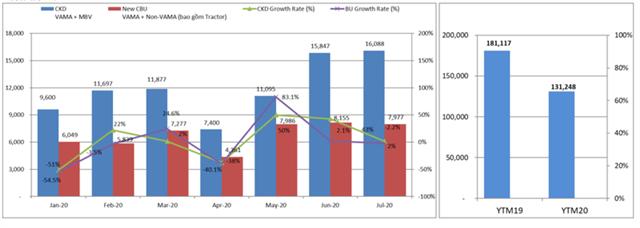Car sales in Vietnam expand for three consecutive months
Car sales in Vietnam expand for three consecutive months
Car sales number in Vietnam in the first seven months of this year dropped 28% year-on-year to 131,248 units across all segments.
The number of cars sold in Vietnam slightly increased by 0.3% month-on-month to 24,065 units in July but decreased 13% year-on-year, according to monthly data from the Vietnam Automobile Manufacturers Association (VAMA).
The figure, however, marked the positive growth in car sales number for three consecutive months following growth of 103% month-on-month in May and 26.4% in June.

Number of car sales in seven-month period. Source: VAMA.
|
The volume included 17,593 passenger cars, up 0.1% inter-monthly; 6,133 commercial cars, up 0.4%; and 339 special-purpose vehicles, up 10%.
The sales volume of locally assembled cars in July was 16,088 units, up 2% against the previous month, and that of imported cars was 7,977, down 2%.
Overall, car sales in Vietnam in the January–July period dropped 28% year-on-year to 131,248 units across all segments. Upon breaking down, 94,275 were passenger cars, down 29% year-on-year; 34,821 were commercial vehicles, down 23%; and 2,152 were special-purpose vehicles, down 39%.
Sales of domestically assembled cars reached 83,604 units during the period, down 22% compared to the same period of last year, while imported completely-built-units (CBUs) totaled 47,644 units, down 36%.

Sales of imported cars down 36% year-on-year in January - July. Source: VAMA.
|
Truong Hai Auto Corporation (Thaco) led the market in the first seven months with 42,589 units sold, followed by TC Motor with 35,620 and Toyota with 30,484.
Automobile is considered a key industry in Vietnam, accounting for approximately 3% of the national GDP. However, this industry was severely impacted by the Covid-19 pandemic, with Viet Dragon Securities Company predicting a decline of 15% in sales volume this year compared to its prevision earlier this year.
The government has been adopting a number of supporting policies to boost sales of made-in Vietnam cars in the remaining months of the year, including the decision to slash the registration fee for domestically-produced cars by 50%, effective from June 28, and extend the deadline for payment of excise taxes for domestically-produced/assembled cars until late 2020.
From July 10, 2020, the government’s Decree No.57 amending and supplementing Decree No. 122, allows domestic assembling companies (meeting standards) to be entitled with 0% import tariff on raw materials, components and supplies which cannot be produced locally. The move is set to reduce production costs by 2-5%, so that selling prices can be consequently lowered in order to boost demand.


























